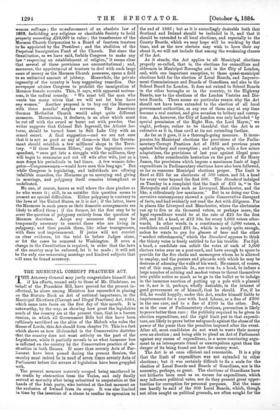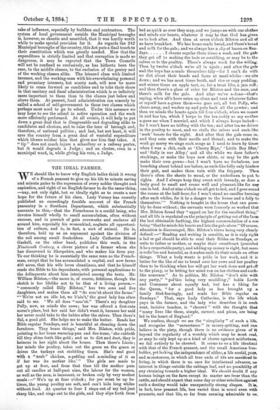THE MUNICIPAL CORRUPT PRACTICES ACT.
THE Attorney-General may justly congratulate himself that if his efforts, second only to those of Mr. Gladstone, on behalf of the Franchise Bill, have proved for the present in- effectual, he alone among Ministers has succeeded in placing on the Statute Book an Act of national importance, in the Municipal Elections (Corrupt and Illegal Practices) Act, 1884, Which came into force on the first day of this month. It is noteworthy, by the way, as showing how great the legislative needs of the country are at the present time, that in a barren Session, in which all Government Bills but this have been ruthlessly sacrificed on the altar of the Moloch who rules the House of Lords, this Act should form chapter 70. This is a fact whieh shows us how ill-founded is the Conservative doctrine that the country does not want activity on the part of the Legislature, while it partially reveals to us what immense loss is inflictedon the country by the Conservative practice of ob- struction in both Houses. If more than seventy Acts of Par- liament have been passed during the present Session, the country must indeed be in need of seven times seventy Acts of Parliament before the arrears of legislation have been grappled with.
The present measure narrowly escaped being smothered in its cradle by obstruction from the Tories, and only finally arrived at maturity after being submitted to amputation at the hands of the Irish party, who insisted at the.last moment on the exclusion of Ireland from its scope. It was also limited in time by the insertion of a clause to confine its operation to
the end of 1886; but as it is exceedingly desirable both that Scotland and Ireland should be included in it, and that it should be extended to all local elections, and especially to the County Boards, which we may hope will be working by that time, and as the new electors may wish to have their say about it, we will not include that among the weakening clauses of the Act.
As it stands, the Act applies to all Municipal elections properly so-called, that is, the elections for councillors and aldermen in Municipal Boroughs and in the City of London, and, with one important exception, to those quasi-municipal elections held for the election of Local Boards, and Improve- ment Commissioners and Boards of Guardians, and also to the School Board for London. It does not extend to School Boards in the other boroughs or in the country, to the Highway Boards, nor to the elections of the London Vestries and Dis- trict Boards. There seems no particular reason why the Act should not have been extended to the election of all local government authorities, as any one of them may at any time become a real contest, and give occasion to bribery and corrup- tion. As, however, the City of London was only included "by special permission of the Right Hon. the Lord Mayor," we ought, perhaps, rather to be thankful that the Act is so extensive as it is, than cavil at its not extending further.
As far as it goes, it is a thorough-going measure. It incor- porates for Municipal elections the provisions of the Parlia- mentary Corrupt Practices Act of 1883 and previous years against bribery and corruption ; and adopts, with a few minor adaptations, the provisions of last year against illegal prac- tices. After considerable hesitation on the part of Sir Henry James, the provisions which impose a-maximum limit of legal expenditure in Parliamentary elections have also been followed, so far as concerns Municipal elections proper. The limit is fixed at £25 for an electorate of 500 voters, and 3d. a head for every voter beyond the first 500. The Standard indulged on Tuesday in a complaint that the limit of £25 is, "in the Metropolis and cities such as Liverpool, Manchester, and the like, a ridiculously low maximum." But in so doing our Con- servative contemporary showed a quite Conservative disregard of facts, and had evidently not read the Act with diligence. For in places like Liverpool and Manchester, where the electorates run up to five or six thousand voters, or perhaps more, the legal expenditure would be at the rate of £25 for the first 500, and 3d. a head, or £12 10s. for every 1,000 voters after- wards. In other words, in a constituency of 5,000 voters, a candidate could spend £81 5s., which is surely quite enough, unless he wants to pay for glasses of beer and the other• "modest refreshments," which the Standard appears to think the thirsty voter is freely entitled to for his trouble. For 30. a head, a candidate can solicit the votes of each of 5,000 electors twice over on a post-card, and have enough to spare to provide for the five clerks and messengers whom he is allowed to employ, and the posters and placards with which he may be desirous of adorning the walls of his ward. He cannot, of course, out of this sum, provide 5s., nor even is. a head, to induce a large number of retiring and modest voters to thrust themselves into public notice so much as to go to the ballot or to indulge in the immense exertion of putting up a pole with a placard on it, nor is it, perhaps, wholly desirable, in the interest of good government or of himself, that he should. For, if he did, he would happily, under this Act, render himself liable to imprisonment for a year with hard labour, or a fine of £200 in the one case, and to a fine of £100 in the other. But, as in the case of Parliamentary elections, prevention is likely to prove better than cure ; the publicity required to be given to election expenditure, and the rigid limit put to that expendi- ture, are likely to prove better safeguards against the abuse of the power of the purse than the penalties imposed after the event. After all, most candidates do not want to waste their money over an election ; and being able to plead an Act of Parliament against any excess of expenditure, is a more convincing argu- ment to an intemperate friend or unscrupulous agent than the danger of its being found out how the money went.
The Act is at once efficient and reasonable. It is a pity that the limit of expenditure was not extended to other elections • but it was certainly difficult to a a scale for the election of Local Boards and Boards of Guardians, nor is the necessity, perhaps, so great. The elections of Guardians have not hitherto been used as an excuse for expenditure, which may influence political votes, nor do they present great oppor- tunities for corruption for personal purposes. But the same can hardly be said of the 800 Local Boards, which, though not often sought on political grounds, are often sought for the
sake of influence, especially by builders and contractors. The system of local government outside the Municipal boroughs is, however, so chaotic and unsettled, that it was hardly worth while to make special provision for it. As regards the 242 Municipal boroughs of the country, this Act puts a final touch to their constitution which was greatly needed. Now that the expenditure is strictly limited and that corruption is made so dangerous, it may be expected that the Town Councils will not be confined so exclusively, as has hitherto been the case, to the middle classes, to the exclusion of the gentry and of the working classes alike. The leisured class with limited incomes, and the working-man with his overwhelming personal and pecuniary interests, but scanty cash, will now be more likely to come forward as candidates and to take their share in that sanitary and fiscal administration which is so infinitely more important to them than to the classes just below and above them. At present, local administration can scarcely be called a school of self-government to those two classes which perhaps most need to go to school. Under this measure we may hope to see the school in active operation and the work more efficiently performed. At all events, it will help to put down a great deal that is disagreeable and degrading alike to candidates and electors, and to raise the tone of borough and, therefore, of national politics ; and last, but not least, it will save the country from a great deal of wasteful expenditure which blesses neither him that gives nor him that takes. A " tip " does not much injure a schoolboy or a railway porter, but it would degrade a Judge ; and an elector, even in a municipal ward, is, while giving his vote, a Judge.















































 Previous page
Previous page